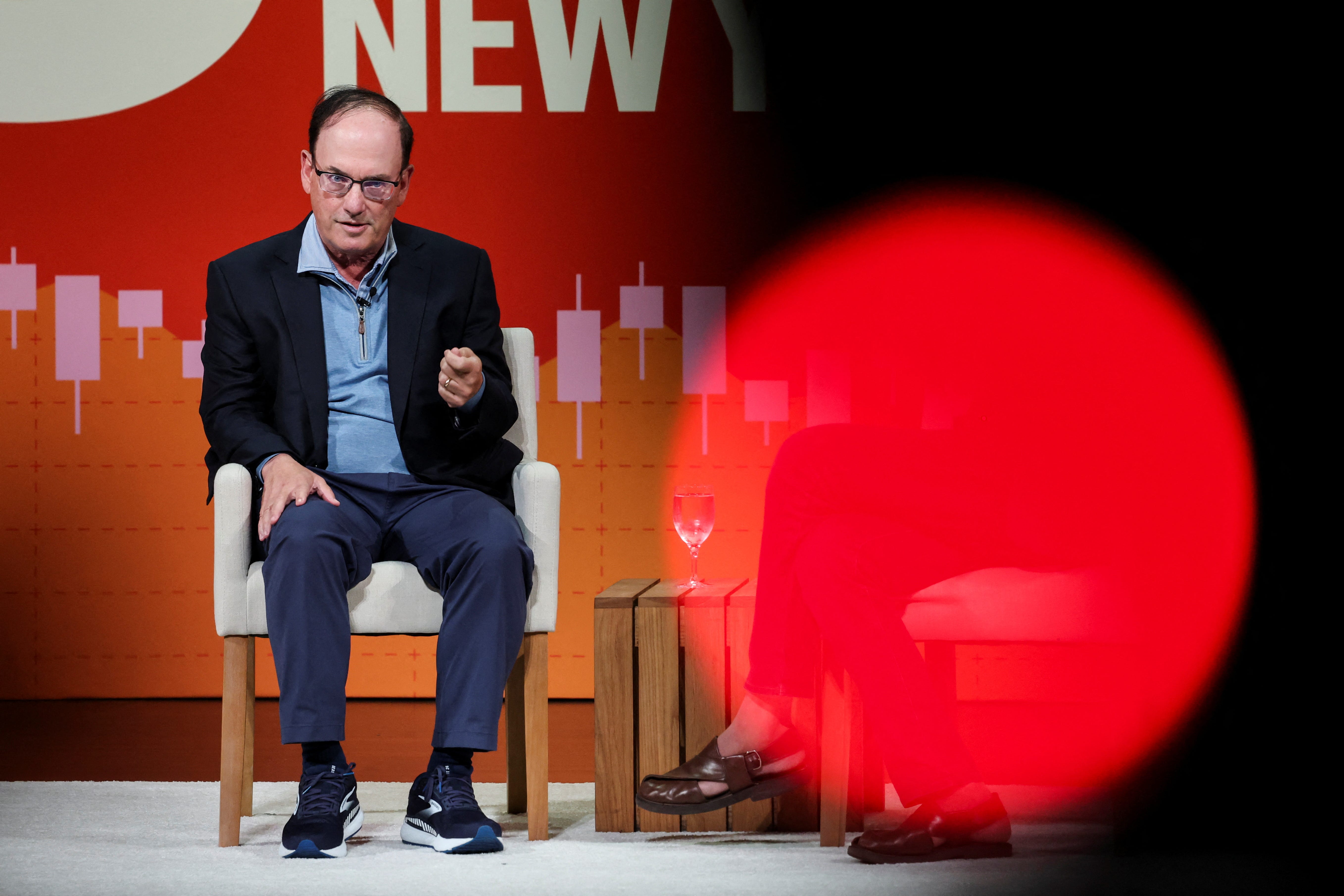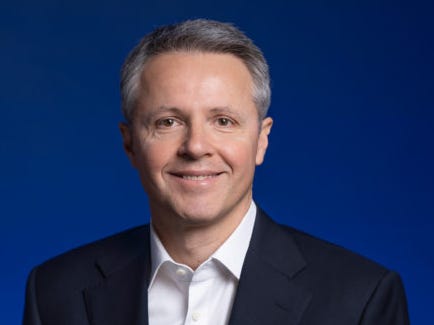
Jeenah Moon/REUTERS
- Steve Cohen last month replaced Cubist chief Denis Dancanet with ex-WorldQuant CIO Geoffrey Lauprete.
- A quiet monthslong search and fortuitous timing led to a surprise deal struck in early September.
- Sign up for Business Insider’s daily markets newsletter here.
To many inside Cubist Systematic Strategies — the roughly $7 billion quant division of Steve Cohen‘s hedge fund Point72 Asset Management — the ouster of president Denis Dancanet last month came as a shock.
When Cohen’s September 10 memo announcing the change landed, Dancanet had already begun preparing for year-end performance reviews, and scheduled meetings that day — including with job candidates — were abruptly canceled, according to people familiar with the matter.
“People close to Denis were surprised,” one of the people said. “Standard business was occurring.”
His big-name replacement, former WorldQuant Chief Investment Officer Geoffrey Lauprete, added to the curiosity. Lauprete had spent much of the past year laying the groundwork for an ambitious hedge fund launch of his own.
Uncertainty loomed in the aftermath, with rumors of cuts and executive resignations swirling. The dust has started to clear in the six weeks since. In town halls and smaller meetings, Point72 leadership reaffirmed its commitment to its roster of 60 independent trading teams and the centralized investing unit that Dancanet built starting in 2020.
“There are no plans to cut [portfolio managers] or investment teams — we remain focused on attracting great talent and growing Cubist,” a Point72 spokesperson said in a statement to Business Insider. They declined to comment on Cubist’s leadership changes. Dancanet also declined to comment.

Point72
This week, Issam Bazzi, a key leader on the central team whose future has been the fixation of market chatter for weeks, signed a long-term contract extension after discussions with Cohen, Business Insider has learned.
But what led to the surprising change at the top has remained murky. Cubist’s performance had been strong during Dancanet’s five-year run, and it remained positive in 2025 even after a short stint of summer losses that plagued the whole industry.
If the shake-up felt sudden to some, that was by design. The announcement capped months of quiet maneuvering by Cohen and his top deputies, who’d started to question whether Dancanet was the right person to lead Cubist, people with knowledge of the matter said. Point72 started a hush-hush search in early summer, auditioning candidates in a closely guarded process to avoid leaks and disruptions to the business, one person with direct knowledge of the matter said.
The result wasn’t a fait accompli. A series of converging events and chance timing culminated in one of the industry’s most unanticipated leadership swaps.
This story is based on conversations with more than a dozen people close to Cubist and Libero Capital, including current and former employees, allocators, and service providers. They requested anonymity because they weren’t authorized to speak on behalf of their companies or to protect client relationships.
Visions of a collaborative Cubist team
Fundamental stock picking is at the core of Cohen’s Point72. But he’s been involved in systematic trading for nearly as long as he’s been running funds, hiring his first quant portfolio manager in 1994.
After longtime Cubist head Ross Garon decamped for Izzy Englander’s Millennium in 2020, Cohen brought in Dancanet, a veteran of the collaborative quant fund PDT — in large part to help realize a long-held desire to diversify from independent teams, or the so-called pod structure, and build a centralized systematic trading team in the mold of traditional powerhouse quant shops like PDT, Renaissance Technologies, or Two Sigma.
“The difference compared to the pod model is that it’s much more collaborative and there’s open communication between the various teams across strategies,” Dancanet explained in a 2023 blog post, which has since been scrubbed from the Point72 website. “The goal is to create a hybrid business structure combining the PM platform and the central team, which we feel would be unique for our industry.”
Dancanet was a cerebral, serene, and well-liked leader, according to those who’ve worked with him. He started on Wall Street in the mid-1990s after defecting from communist Romania in 1985.
He joined Cubist after a four-year hiatus from quant trading, working on startups — one focused on flying cars and the other on applying data science to consumer lending.
An ambitious buildout and a pain point
Dancanet immediately got to work building a centralized trading unit from scratch, an endeavor that, like any quant investment platform, would be expensive and take years to realize. Dancanet lured marquee hires, including former colleague Bazzi, from places like Citadel, Jump Trading, Squarepoint, and Tower Research.
The road didn’t lack bumps — the head of Cubist’s high-frequency trading effort left after less than a year on the job — but the central group began trading and making money after a couple of years. It reached 100 people in 2025 and through mid-year had strong performance, according to two people with knowledge of the matter.
The other key part of Dancanet’s job was something he lacked experience in: hiring PMs to run the independent pods Cubist is known for. Unlike hiring discretionary stock pickers, who can be up and running in days or weeks, bets on systematic PMs can take years to bear fruit as they assemble the necessary data and infrastructure, research and backtest strategies, and execute trading models.
While returns at Cubist, which has doubled head count over the past three years, remained robust in the years after Dancanet joined, a pain point emerged with Cohen: Many of the PMs Dancanet brought in weren’t moving the needle, according to people familiar with the matter.
Cubist money managers who predated Dancanet generated a disproportionate amount of the returns, according to people familiar. Whether his leadership contributed to or improved the legacy PMs’ performance is unclear, but Cohen wanted to see improvement on the disparity.
While many PMs dislike micromanaging executives, Dancanet’s more laissez-faire leadership style may have given Cohen and top deputies pause, insiders said.
Dancanet’s contract was up for renewal before the end of the year, and Cohen’s team started to quietly explore alternatives.
Lauprete’s fundraising leads to Point72
For Point72, Lauprete was a uniquely attractive candidate. At WorldQuant, he oversaw a massive centralized investment process, though the fund also has independent pods.
Moreover, Lauprete, who left WorldQuant after 17 years in early 2024, wasn’t bound by one of the lengthy noncompete clauses that often sideline quants for years, meaning he could start immediately — minimizing disruption at Cubist. The catch: He had spent considerable time and money preparing the launch of his own fund, Libero Capital.
Lauprete initially secured Paloma Partners, the storied hedge fund founded by Donald Sussman in the 1980s, as an anchor investor. The relationship soured, and by April, according to Hedge Fund Alert, Lauprete and Paloma parted ways.
Lauprete continued pitching investors through the spring and summer, drawing interest from firms including Engineers Gate, BlackRock, and Blackstone, people familiar said. (Representatives for those firms declined to comment.)
He also held an initial meeting with Cubist, including Dancanet, in early summer about having Libero manage a slug of capital. But unbeknownst to Dancanet, discussions continued separately with Point72 leaders and evolved in scope.
A quiet search heats up
In early summer, Cubist — like most quant funds — was having a strong year. Systematic long-short funds were up double digits heading into June, according to a Goldman Sachs research report. The central team was profitable, and Dancanet aimed to eventually dedicate half of Cubist’s capital to it, people familiar with his plan said.
But then the steady, mysterious losses across the quantitative trading industry started to pile up, turning into a two-month bloodbath. Cubist experienced a severe drawdown, suffering its worst stretch since the COVID pandemic in early 2020, but recovered some of those losses, and year-to-date performance remained positive.
Unlike setups at some rivals, Cubist isn’t a stand-alone fund investors can allocate to with separately reported returns; its performance flows into Point72’s overall returns. Point72 recorded gains in July and August and is up 9.7% through September.
Point72’s under-the-radar search for a potential Cubist successor continued.
But while Libero was generating intrigue, capital commitments sufficient for its ambition weren’t materializing, sources with knowledge of the matter said. Some investors were wary of the scale and associated costs of a large-scale quant launch as well as the autonomy Lauprete wanted, the people said.
Lauprete, who was funding Libero out of his own pocket, was simultaneously interviewing with Point72 executives about the Cubist job, a process kept closely guarded to avoid leaks, one insider said.
Dancanet and Cohen discussed contract extensions over the summer without coming to a conclusion. Then, over the first weekend in September, Lauprete and Cohen agreed to terms that would install Lauprete as Cubist president and move Libero under the unit’s umbrella, people close to the firm said. Days later, Cohen sent out the memo announcing the leadership change.
Cohen convened a short-notice virtual meeting with Cubist PMs the next day, one company insider said, reassuring them that he remained committed to both sides — the pods and the central team — of his hybrid vision for Cubist.
Some industry insiders called it an opportunistic fit for both sides: a more seasoned leader for Cubist, and for Lauprete, a chance to land one of Wall Street’s most coveted quant jobs while keeping Libero alive, which will join Cubist as an independent pod, people familiar said. He started the role at the beginning of October.
The months and years ahead will reveal whether Cohen’s leadership shake-up pays off — and whether Lauprete can deliver on the challenge of fusing Cubist’s independent pods and central team ambitions into a single machine that churns out industry-beating returns.
Read the original article on Business Insider
The post Inside Steve Cohen’s Cubist shake-up: How a quiet search and chance timing led to the surprising change at Point72 appeared first on Business Insider.




